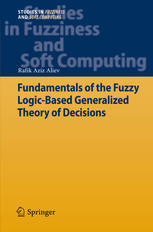

Most ebook files are in PDF format, so you can easily read them using various software such as Foxit Reader or directly on the Google Chrome browser.
Some ebook files are released by publishers in other formats such as .awz, .mobi, .epub, .fb2, etc. You may need to install specific software to read these formats on mobile/PC, such as Calibre.
Please read the tutorial at this link: https://ebookbell.com/faq
We offer FREE conversion to the popular formats you request; however, this may take some time. Therefore, right after payment, please email us, and we will try to provide the service as quickly as possible.
For some exceptional file formats or broken links (if any), please refrain from opening any disputes. Instead, email us first, and we will try to assist within a maximum of 6 hours.
EbookBell Team

5.0
98 reviewsEvery day decision making and decision making in complex human-centric systems are characterized by imperfect decision-relevant information. Main drawback of the existing decision theories is namely incapability to deal with imperfect information and modeling vague preferences. Actually, a paradigm of non-numerical probabilities in decision making has a long history and arose also in Keynes’s analysis of uncertainty. There is a need for further generalization – a move to decision theories with perception-based imperfect information described in NL. The languages of new decision models for human-centric systems should be not languages based on binary logic but human-centric computational schemes able to operate on NL-described information. Development of new theories is now possible due to an increased computational power of information processing systems which allows for computations with imperfect information, particularly, imprecise and partially true information, which are much more complex than computations over numbers and probabilities.
The monograph exposes the foundations of a new decision theory with imperfect decision-relevant information on environment and a decision maker’s behavior. This theory is based on the synthesis of the fuzzy sets theory with perception-based information and the probability theory.
The book is self containing and represents in a systematic way the decision theory with imperfect information into the educational systems. The book will be helpful for teachers and students of universities and colleges, for managers and specialists from various fields of business and economics, production and social sphere.